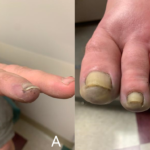Although inflammatory markers, such as erythrocyte sedimentation rate (ESR) & C-reactive protein (CRP) can be useful in rheumatology, they are non-specific in the ICU setting, according to Dr. Vladamir Despotovic.
Respiratory Failure
Vladamir Despotovic, MD, associate professor of medicine, Washington University, St. Louis, Mo, spoke next. According to Dr. Despotovic, common rheumatic illnesses seen in the intensive care unit (ICU) include rheumatoid arthritis, inflammatory polyarthritis, SLE and lupus-related disorders, systemic sclerosis, septic arthritis, systemic vasculitis, inflammatory myopathy, interstitial lung disease and gout. He said the most common reason for fever and ICU admission is infection, and the most common organ system failure in patients with rheumatic disease that requires ICU care is respiratory failure.
Patients in the ICU typically present as critically ill, with life-threatening disease processes, said Dr. Despotovic. They may have rheumatologic etiologies with a prominent respiratory failure component. Although serologic testing may be useful, he explained the results can sometimes be delayed and must be interpreted within the clinical context. Moreover, although inflammatory markers, such as erythrocyte sedimentation rate (ESR) and C-reactive protein (CRP) can be useful in rheumatology, they are non-specific in the ICU setting.
Few publications have addressed mortality in patients with rheumatic disease in the ICU, explained Dr. Despotovic. However, he cited one paper that described a broad range of mortality (17–79%) based on severity of presentation.5 Some critical care disease scoring systems, such as Acute Physiology and Chronic Health Evaluation (APACHE II), Simplified Acute Physiology Score (SAPS II) and Sequential Organ Failure Assessment (SOFA), may be useful in predicting mortality.
Moreover, patients with rheumatic disease in the ICU are often at the extremes of medical illness and require extracorporeal membrane oxygenation (ECMO) support.
Dr. Despotovic’s take-home message was to “allow yourself to be appropriately aggressive.”
Lara C. Pullen, PhD, is a medical writer based in the Chicago area.
References
- Babar F, Cohen SD. Thrombotic microangiopathies with rheumatologic involvement. Rheum Dis Clin North Am. 2018 Nov;44(4):635–649.
- Fukaya S, Yasuda S, Hashimoto T, et al. Clinical features of haemophagocytic syndrome in patients with systemic autoimmune diseases: Analysis of 30 cases. Rheumatology (Oxford). 2008 Nov;47(11):1686–1691.
- Klein Am, Molad Y. Hematological manifestations among patients with rheumatic diseases. Acta Haematol. 2021;144(4):403–412.
- Woodworth TG, Suliman YA, Li W, et al. Scleroderma renal crisis and renal involvement in systemic sclerosis. Nat Rev Nephrol. 2016 Nov;12(11):678–691.
- Quintero OL, Rojas-Villarraga A, Mantilla RD, et al. Autoimmune diseases in the intensive care unit: An update. Autoimmun Rev. 2013 Jan;12(3):380–395.



